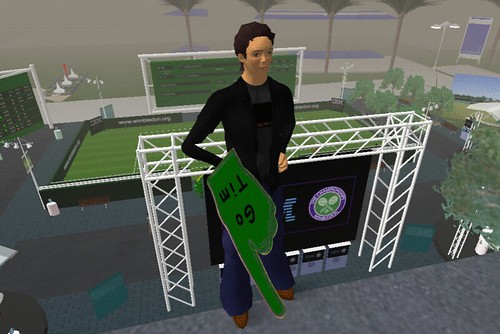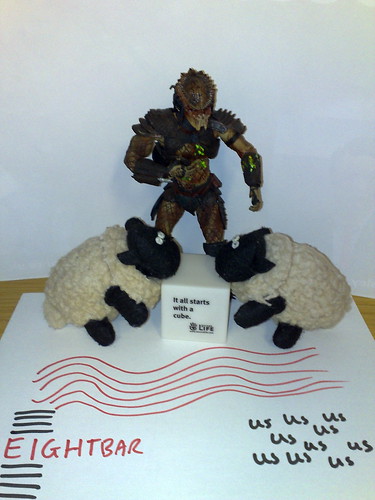Welcome to Kolya Oh or Nicolai Rygh in Real Life. He has been very active with us here in the metaverse recently and has some very intersting customer projects. He has registered http://www.eightbar.no which is our first franchise.
Nicolai has written the following piece, as we experiment with extending the eightbar brand.
I read on a blog last week about a future scenario where Gucci launched their new DRM-free clothes.
ďThese threads can be worn an infinite number of times, anytime of the year. If you happen to have multiple closets, these DRM-free clothes can be moved to and from your different closets.Ē
This made me think about the Digital Rights Management in SL and other virtual worlds. My avatar owns a suit that I paid some linden dollars for. It is ďmyĒ virtual business wear, but I donít own any other right then to have it on my avatar, keeping it in my inventory in SL or deleting it. The same is with my SL car Ė a brand new MD C-class that I spent some Linden dollars to get but I donít own it as I canít sell it.
When you buy a commodity in real life is it because you are planning to put the item in use or it is an investment. The difference between the two is that the first will be worth nothing to others as soon as you have started using it, but the other can be sold at a lower or higher price later. There is a second-hand market for a lot of stuff, so even if it isnít a good investment, the possibility to cut your losses on the investment is possible.
As SL is growing in terms of economic factors, and some people even argue that it is an independent economy, the terms of business between avatars should over time equal real life terms. If I go to the car dealership and pick up a brand new car that I can drive around in, and use as mine but that I canít sell or transfer it; then that isnít a buy. This setup in real life term is leasing. You pay for the right to use, but you donít get the ownership of the item. And as I canít sell or transfer my SL stuff, then the real life term would be that I have a leasing agreement with the owner. The upside in the real world is that you pay for a service of using the commodity and not the risk of owning an asset of depreciating value. Normally you pay fixed amounts weekly or monthly when you lease, and not all upfront.
In the end if I build a successful avatar with the right to use a lot of stuff that I canít transfer to other avatars, then the solution could be to sell my avatar to somebody else, and restart my adventure. That could even be the option if I would like to move my virtual business to another platform. The market to sell avatars is probably a bit thin at the moment, but on other scenarios the possibility to buy a player with high market value is normal. Establishing a market for trading avatars would affect the in world value of the items and commodities, and maybe also the impact of using this strict DRM settings on the items. The next question would be if I own the right to replicate my real life items in SL. If I do, then the DRM settings on the items in SL are only to secure the rights of the guy that did the development (and in this case replicated some real life objects). The right to use the objects is only have restrictions in SL, so if I find a way to copy the items out of SL into some 3D warehouse for reuse in other virtual worlds, then I am Copyrights and patents in real life donít transfer automatically over to SL, but I guess weíll see some law suits that will resolve this if anybody provoke some of the big brands. And the question then weíll be where the border between virtual and real life digital rights will be.
Nicolai Rygh/Kolya Oh(SL)


















